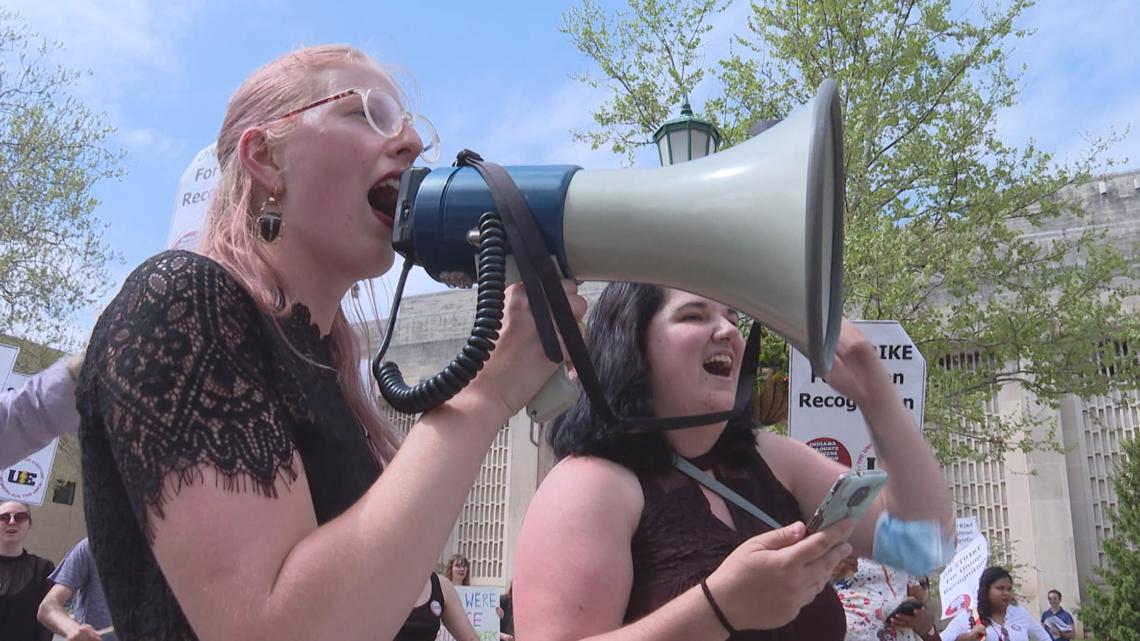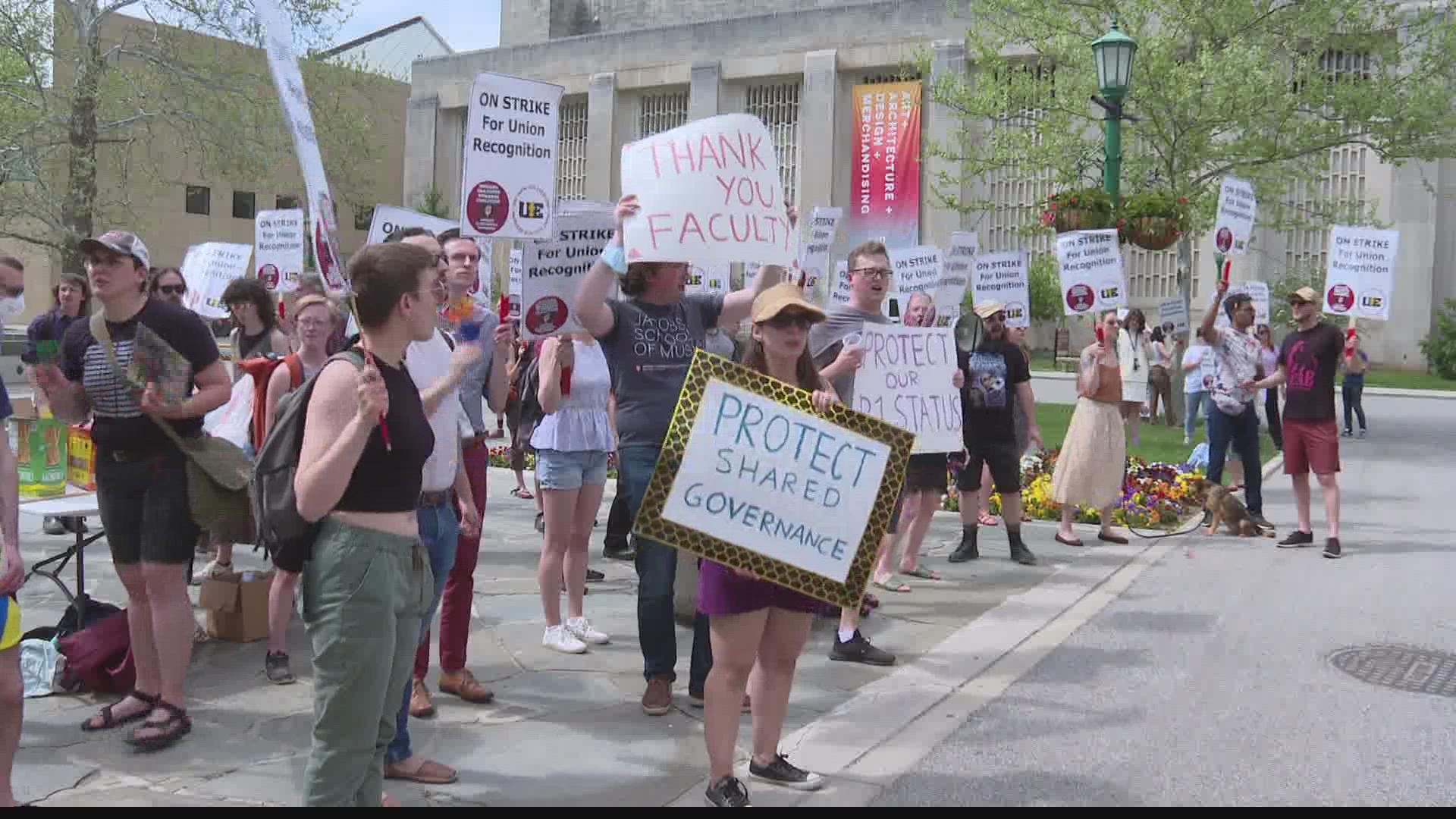BLOOMINGTON, Ind. — It's been more than two months since hundreds of Indiana University grad student workers first voted to leave the classroom and form a picket line at the Bloomington campus.
IU has said it has made changes to improve conditions already, like increasing minimum pay, and is intending to make more changes. But they've stood firm thus far, saying they will not consider a union.
Now, faculty have been getting involved. After an in-person faculty meeting was held at the IU Auditorium May 9 for the first time in 17 years, faculty present were able to approve items for a vote. Throughout this past week, faculty have been sending in ballots via email to weigh in on the ongoing grad student worker strike.
Now, the ballots are in. While the results aren't expected to be released until Monday morning, faculty at IU say they're hopeful that regardless of the result, this will bring IU's administration to the bargaining table.
"I want to be hopeful that it will persuade them because I think a win-win solution is possible," said Ben Robinson, Germanic Studies chair at IU and the Bloomington Chapter president of the American Association of University Professors.
After weeks of grad students striking, now, faculty are formally weighing in. Ballots have been out online for faculty on two resolutions. The first giving them more control of graduate student reappointments, and the second pushing the administration to bargain with grad student workers.
“I wouldn’t be a scholar and a teacher if I didn’t believe in the force of the better argument to win a debate. And I ultimately believe that the force of the better argument can prevail and that the upper administration can come to see that the decision to allow unionization is a decision not only in the best interest of the grad students but in the best interest of the institution,” Robinson said.
Robinson said he's expecting the vote to come overwhelmingly from faculty in support of grad student workers as it did during the in-person faculty meeting earlier this month. He said he hopes it pushes IU's administration to listen, because if they don't it will raise further concerns.
"There will be enormous dissatisfaction. And it will set up a very concerning dynamic in which not only do graduate students feel their voice is not being recognized by the senior administration but the faculty feels their voice isn't being recognized," Robinson said.


While grad student workers voted to suspend the strike until fall, their fight is far from over. And with faculty now involved, Robinson said they're all watching and waiting closely to see if IU's administration is ready to blink.
“It’s clear that people aren’t going to back down and that we’re going to continue to have strife on campus and there’s going to be a continued demand for a resolution. And if the provost doesn’t or the current administration doesn’t work toward a resolution, then they will rapidly lose the confidence of the faculty. And I think that would certainly be at stake in the fall,” Robinson said.
While IU faculty voted throughout the week, an information sheet sent out to Bloomington faculty from IU warned that a union would erode the existing relationship between students, advisors and their schools. In that information sheet, they stress that the union and IU's values aren't aligned, saying it's "govern or be governed."
But faculty say IU has not presented any evidence that a union would be harmful to the university.
An empirical study published in 2013 that looked at data from PhD students in five academic disciplines across eight public universities in the US. It found that unionization doesn't have the presumed negative effect on student outcomes, instead having a positive effect in some cases.
The study reported that union-represented grad student workers reported higher levels of personal and professional support and higher pay as well as similar perceptions of academic freedoms in both union-represented and non-union grad students. And based on their findings, the study found that any potential harm to faculty-student relationships and academic freedoms should not continue to serve as a basis for denying collective bargaining right to grad student workers.
How does the Big Ten compare?
In the Big Ten, six member universities have unions representing graduate student workers - the University of Illinois, University of Iowa, University of Michigan, Michigan State University, Rutgers University - New Brunswick and University of Wisconsin-Madison.
Some institutions, like the University of Iowa, have had their unions in place for nearly 30 years.
Rutgers University for example, has said along with having a union for graduate student workers, they've also steadily increased their pay over the past ten years. Since 2012, the minimum base salary for teaching assistants and graduate assistants has increased 17% for calendar-year appointments up to $33,999 and up 18.5% for academic-year appointments, going from around $25,000 up to around $30,000.
Eight universities in the Big Ten do not have unions representing their graduate student workers, including Purdue University.
Of those Big Ten universities without unions representing their graduate student workers, all eight have had pushes in the past from their grad student workers to attempt to unionize. Social media accounts and previous news stories indicate that many of those graduate student workers are still fighting to unionize and collectively bargain at their respective universities.

